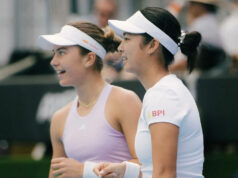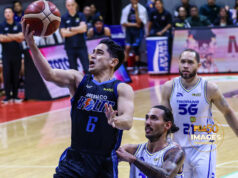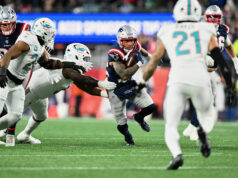Not a few quarters pegged the Warriors to be goners the moment Kevin Durant was confirmed to have been injured and unable to return in Game Five of their semifinal-round series against the Rockets. Already with a history of calf strains, the former league Most Valuable Player appeared to have suffered from one anew shortly after he scored on a jumper with 2:11 left to play in the third quarter. He clutched his right leg as he was running back on defense, compelling him to leave the court — and, evidently, for good after he was examined and ruled ineligible to return. They were then just up by three points and legitimately wondering how they could cope without their most indispensable performer.
The fallback was, to be sure, clear to all and sundry. The Warriors would revert to their pre-Durant sets, through which a title in two trips to the Finals proved they were no slouches. Still, those from the outside looking in raised queries on how they could take the measure of the formidable Rockets in his absence when they barely kept pace with him around. Of course, hoops isn’t all theory, and practice often yields spectacular results, precisely the reason matches are played with passion. And, with cause, they believed the burden of proof wasn’t theirs, but the Rockets,’ to carry.
As things turned out, the Warriors claimed Game Five, and then Game Six on the road, in the clutch. In both cases, the usual suspects stepped up; Steph Curry, Klay Thompson, Draymond Green, and Andre Iguodala were simply outstanding. Meanwhile, the Rockets had ample opportunities to pounce, but, under pressure, somehow failed to live up to promise; James Harden and Chris Paul were up to the task, but, unlike their fellow marquee names, did not have an achieving supporting cast to backstop their efforts. As general manager Daryl Morey tweeted in the aftermath, “You come at the king, you best not miss.” And they did. A lot.
Considering how the best-of-seven affair ended, it’s with no small irony that the Warriors got help from a supposedly thin bench, and that the Rockets got little to none from a deeper one. Intangibles certainly count. Every single charge Steve Kerr tapped wound up exceeding prognoses, perhaps buoyed by the confidence shown by the stars. Mike D’Antoni was not as lucky, and it’s fair to wonder if his notoriously short rotations factored in on the outcome; heralded midseason acquisition Kenneth Faried, for instance, played all of five minutes in the entire series.
“F– ing giants” was how Kerr described the Warriors after they prevailed in Game Five, and he’s right. They may have had a tumultuous regular season beset with injuries and infighting, but they also have a winning culture that trumps their travails. It was what they leaned on in overcoming the loss of DeMarcus Cousins, and then Durant. No doubt, they wanted to show up the Rockets in the worst way possible, but, really, they didn’t need extra motivation other than that of their desire to be, well, themselves. It’s why they’re on track for a three-peat, and why, for all the challenges ahead, they understand that only they can truly derail their date with fate.
Anthony L. Cuaycong has been writing Courtside since BusinessWorld introduced a Sports section in 1994.



